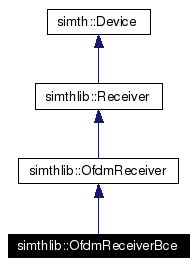
#include <ofdmreceiverbce.h>
Inheritance diagram for simthlib::OfdmReceiverBce:

Public Member Functions | |
| OfdmReceiverBce (int deviceID, simth::DeviceSystemIntf *system, const simth::PropertyList &pl, int oversampling, int carr, double guardTime, double dist, ofdm::FillUpScheme diffScheme) | |
| void | print (std::ostream &os) const |
Protected Member Functions | |
| bool | useChannelEstimation () const |
| virtual void | blindChannelEstimation (const simth::ModSeq &modSymbols, simth::ModSeq *transfer) const =0 |
| virtual void | channelEstimation (const simth::ModSeq &modSymbols, simth::ModSeq *transfer) const |
Related Functions | |
| (Note that these are not member functions.) | |
| propertylist_OfdmReceiverBce (not_a_function) | |
|
||||||||||||||||||||||||||||||||||||
|
|
|
||||||||||||
|
In derived classes this functions implements the used blind channel algorithm. This function is used to obtain a blind channel estimation in derived classes. The derived functions fill the sequence 'transferFunction' with the channel transfer factors. Note that in the majority of cases derived functions have to map the index of the complex output sequence to the OFDM index that represents the position within the corresponding block of received OFDM symbols (i.e. the number of the OFDM-symbol (time) and the number of the subcarrier (frequency)). This mapping is done using the function origIndex2ofdmIndex(). See the description of this class for further information. Then in a last step, the estimated transfer factors for the block of OFDM-Symbols have to mapped back to the 'original' index of the output sequence. This mapping is done using the function ofdmIndex2origIndex(). The implementation in this class just sets all elements of 'transfer' to 0.0.
|
|
||||||||||||
|
This function can be used to obtain a channel estimation in derived classes. The derived functions fill the sequence 'transferFunction' with the channel transfer factors. Note, if the channel estimation is based on the given complex output sequence, in the majority of cases the index within this complex output sequence has to be mapped to the OFDM index. The OFDM index represents the position within the corresponding block of received OFDM symbols (i.e. the number of the OFDM-symbol (time) and the number of the subcarrier (frequency)). This mapping is done using the function origIndex2ofdmIndex(). See the description of this class for further information. Then in a last step, the estimated transfer factors for the block of OFDM-Symbols have to mapped back to the 'original' index of the output sequence. This mapping is done using the function ofdmIndex2origIndex(). The implementation in this class just sets all elements of 'transfer' to 0.0.
Reimplemented from simthlib::OfdmReceiver. |
|
|
Reimplemented from simthlib::OfdmReceiver. |
|
|
|
|
|
These are the properties of class OfdmReceiverBce . This list is auto-generated from the XML-Devicelist of this device by means of an XSLT transformation script. Description of this device in the XML file: This abstract class is the base class of each receiver with blind channel estimation (BCE). A derived receiver has to override the pure abstract function blindChannelEstimation() to define its own BCE-algorithm. Note that this class also has the Properties of its base classes. The direct base class is simthlib::OfdmReceiver ; direct link to its propertylist should be propertylist_OfdmReceiver(). The list below usually includes the properties that have been inherited from the base classes; the properties which belong only to this class can be found at the end of this list.
No properties defined in this particular class. |
 1.4.1
1.4.1